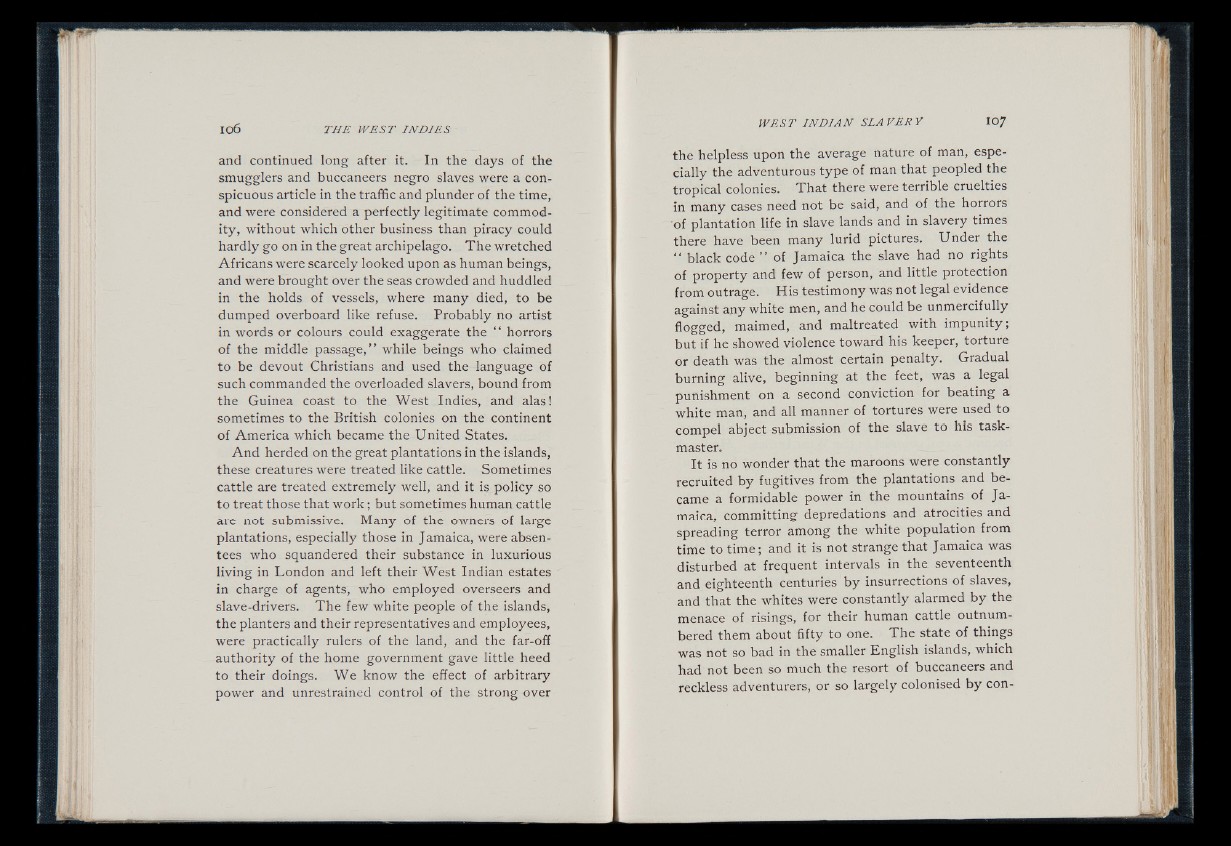
and continued long after it. In the days of the
smugglers and buccaneers negro slaves were a conspicuous
article in the traffic and plunder of the time,
and were considered a perfectly legitimate commodity,
without which other business than piracy could
hardly go on in the great archipelago. T h e wretched
Africans were scarcely looked upon as human beings,
and were brought over the seas crowded and huddled
in the holds of vessels, where many died, to be
dumped overboard like refuse. Probably no artist
in words or colours could exaggerate the “ horrors
of the middle passage,” while beings who claimed
to be devout Christians and used the language of
such commanded the overloaded slavers, bound from
the Guinea coast to the West Indies, and alas!
sometimes to the British colonies on the continent
of America which became the United States.
An d herded on the great plantations in the islands,
these creatures were treated like cattle. Sometimes
cattle are treated extremely well, and it is policy so
to treat those that w o rk ; but sometimes human cattle
are not submissive. Many of the owners of large
plantations, especially those in J amaica, were absentees
who squandered their substance in luxurious
living in London and left their West Indian estates
in charge of agents, who employed overseers and
slave-drivers. T h e few white people of the islands,
the planters and their representatives and employees,
were practically rulers of the land, and the far-off
authority of the home government gave little heed
to their doings. W e know the effect of arbitrary
power and unrestrained control of the strong over
the helpless upon the average nature of man, especially
the adventurous type of man that peopled the
tropical colonies. That there were terrible cruelties
in many cases need not be said, and of the horrors
of plantation life in slave lands and in slavery times
there have been many lurid pictures. Under the
“ black code ” of Jamaica the slave had no rights
of property and few of person, and little protection
from outrage. His testimony was not legal evidence
against any white men, and he could be unmercifully
flogged, maimed, and maltreated with impunity;
but if he showed violence toward his keeper, torture
or death was the almost certain penalty. Gradual
burning alive, beginning at the feet, was a legal
punishment on a second conviction for beating a
white man, and all manner of tortures were used to
compel abject submission of the slave to his taskmaster.
I t is no wonder that the maroons were constantly
recruited by fugitives from the plantations and became
a formidable power in the mountains of Jamaica,
committing depredations and atrocities and
spreading terror among the white population from
time to time; and it is not strange that Jamaica was
disturbed at frequent intervals in the seventeenth
and eighteenth centuries by insurrections of slaves,
and that the whites were constantly alarmed by the
menace of risings, for their human cattle outnumbered
them about fifty to one. T h e state of things
was not so bad in the smaller Knglish islands, which
had not been so much the resort of buccaneers and
reckless adventurers, or so largely colonised by con